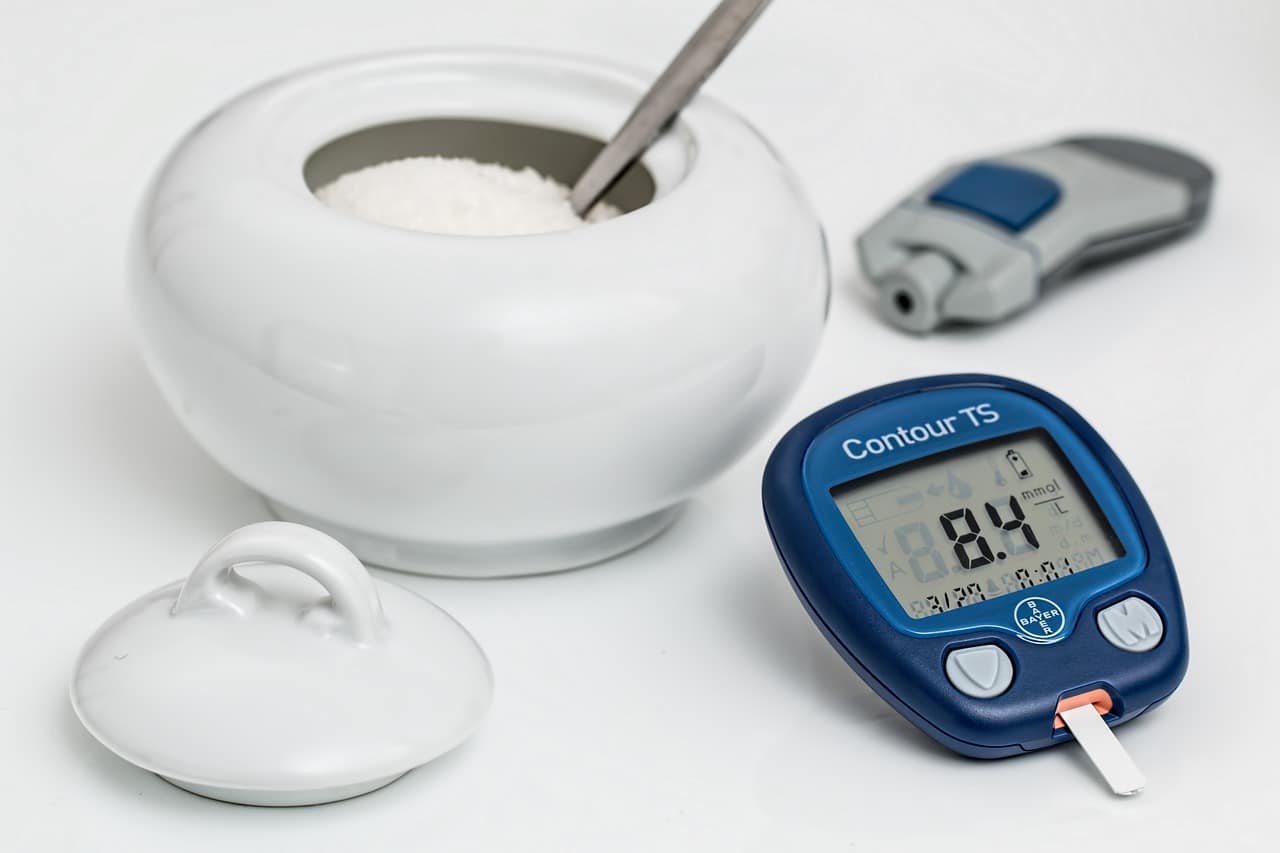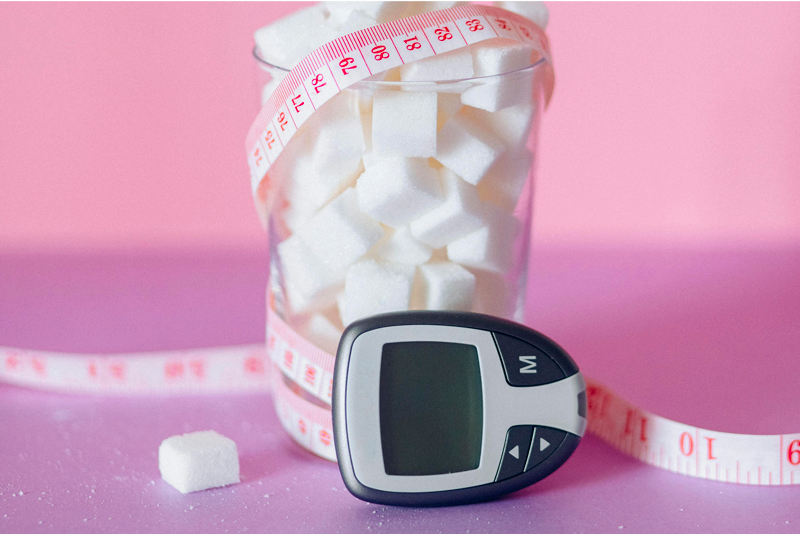
Managing blood sugar improves your overall well-being.
It is recommended to keep blood sugar levels within a range of 0.70g/l to 1.10g/l in the fasting state and less than 1.40g/l 1.5 hours after a meal. Maintaining it within this range is essential for good health.
When it is chronically too high, it can affect the blood vessel system and lead to serious vascular accidents. When it is too low (hypoglycaemia), it causes a feeling of weakness and can lead to fainting.
At first, managing blood sugar levels may seem difficult. However, these few tips will help make it much easier to manage it on a daily basis.
So, here are some tips and tricks to help you control your blood sugar:
1. Eat a balanced diet.
Eating a healthy, balanced diet will make controlling your blood sugar easy as pie. As with everything, moderation is important. Include plenty of fruit, vegetables, whole grains and lean protein in your diet. In general, avoid processed foods and sugary drinks.
Include lots of fruit and vegetables:
Fruits and vegetables are high in fibre, vitamins and minerals, and low in calories. They also have a low glycaemic index, which means they have minimal impact on blood sugar levels. Try to include a variety of colourful fruits and vegetables in your diet, such as berries, leafy greens and root vegetables.
Incorporate “lean” protein:
“Lean” proteins, such as fish, chicken, turkey and tofu, can help slow the absorption of carbohydrates, keeping blood sugar levels stable. In addition, these so-called lean proteins play a vital role in building and protecting muscle.
Opt for whole grains:
Whole grains, such as quinoa, brown rice and whole wheat bread, are high in fibre and provide slow-digesting carbohydrates, which can help keep blood sugar levels stable. Try to stay away from refined grain foods, such as white bread and pasta. These can cause rapid blood sugar spikes.
Cut out added sugars:
Added sugars are an obvious cause of rapid blood sugar spikes. Avoid sugary drinks, such as sodas and juices, and limit your intake of sweets and desserts.
Avoid processed foods:
Processed foods are often high in added sugars and saturated fats and can cause rapid blood sugar spikes. Instead, opt for whole, unprocessed foods, such as fruits, vegetables, whole grains and lean proteins.
Plan your meals and snacks:
Plan your meals and snacks in advance to avoid impulse eating. This way you can ensure that you always have healthy options. Depending on your physical activity, plan a yoghurt and fruit or a compote with no added sugar, a cereal bar (without chocolate coating), a piece of wholemeal bread with jam… Planning ahead will help you avoid having a random case of the munchies or finding yourself unable to resist a chocolate bar saturated with fats and sugars.
Eat at regular intervals:
Eating regularly can help keep your blood sugar levels stable, so it is important to eat at regular intervals throughout the day.
By following these tips, you can create a healthy, balanced diet that can help you keep your blood sugar levels in check.
In some cases, or if you are making a lifestyle change, it may be worth working with a health care professional or dietitian to develop a personalized meal plan that meets your specific needs.
2. Exercise regularly.
Physical activity can help lower blood sugar and improve overall health by increasing insulin sensitivity, reducing inflammation and improving cardiovascular health. Regular exercise, combined with a healthy diet, can be a powerful tool for controlling blood sugar.
Try to be active throughout the day. Incorporate activities into your daily routine, such as taking the stairs instead of the lift, taking a walk during lunch breaks or doing chores around the house. Aim for at least 30 minutes a day of moderate-intensity exercise, such as brisk walking, cycling or swimming.
In short, regular physical activity is an essential aspect of controlling your blood sugar. Consider working with a personal trainer or exercise physiologist to develop an individualised exercise plan that meets your specific needs. Consult a health care professional before starting any new exercise program and check your blood sugar before and after exercising to understand how it is affected.
3. Drink plenty of water
Water can be an effective way to regulate your blood sugar. When your blood sugar rises, your body tries to get rid of excess glucose. Without insulin to reduce sugar levels, your system processes the sugar in your urine and you get rid of it by going to the bathroom. However, this mechanism can lead to dehydration, and ultimately an increase in your blood sugar levels. Drinking water throughout the day can prevent dehydration and help your body process glucose more efficiently.
Water can also help you manage your blood sugar. When you eat something, your body converts it into glucose, which is a type of sugar. Drinking water can help dilute the amount of glucose in your blood, which helps lower your blood sugar. In addition, water can help you feel fuller for longer, by reducing your appetite and reducing the amount of carbohydrates you eat. Drinking water can therefore be a simple way to ensure that your blood sugar levels stay balanced.
4. Do not skip meals
Managing your blood sugar doesn’t mean going on a diet. It’s actually the opposite. It simply means monitoring what you eat to maintain a balance between what you eat and how active you are.
Are you eating healthy, drinking water and exercising regularly? That’s enough to keep your blood sugar stable.
Don’t skip meals to “make up for” excesses. You will throw your body off balance. Lowering your blood sugar in this way will actually make it skyrocket the next time you eat. Your body will react by releasing more insulin, which has the opposite effect of what you wanted to happen, turning sugar into fat.
5. Manage your stress
Stress can affect your blood sugar levels. Mechanically, in a stressful situation, your body goes “on the defensive”. It takes over to protect itself. The release of adrenaline alone causes a rise in blood sugar levels.
Managing stress is essential to controlling your blood sugar. Stress hormones, such as epinephrine, cortisol, glucagon and growth hormone, can all play a role in raising your blood sugar. Constant stress can also leave you mentally and physically exhausted. Your body is exhausted and struggles to manage its blood sugar levels. By actively managing stress levels, you can help prevent long-term complications and control your blood glucose levels.
There are different ways to manage stress. WebMD suggests physical activity, such as walking or running, to help cope with everyday stressors. Meditation and yoga can also help reduce stress and improve your overall health and well-being. Other methods of stress relief include journaling, listening to soothing music and talking to a friend or family member. Sometimes, to lighten the weight of a mental load, it’s just a matter of breaking it down into smaller tasks and simply scheduling them.
Get some help
You have to remember that stress management is an ongoing process. Try to identify what triggers stress in your life and look for ways to avoid or reduce those triggers. If you feel overwhelmed, seek help from health care professionals or a counsellor. Taking care of your mental health is essential to effectively managing stress and controlling your blood sugar.
Sometimes it’s a good idea to work with a health care professional who can help you develop an individualized plan to manage your blood glucose. This plan can help you monitor your blood sugar levels, adjust your medications – if required – and make lifestyle changes.
By following this advice, you can effectively manage your blood sugar and improve your overall health. Remember to also consult your healthcare professional with any other questions or concerns.
Our latest publications
Want to learn more about topics related to blood sugar management?
Here are our most recent blog posts!



